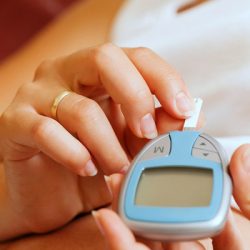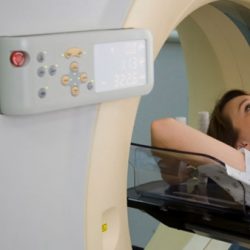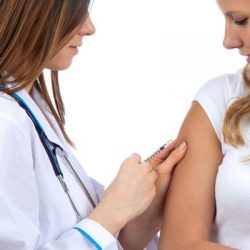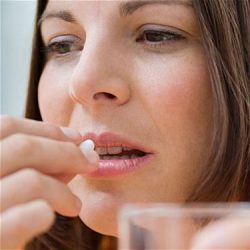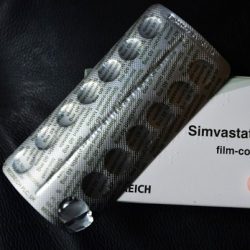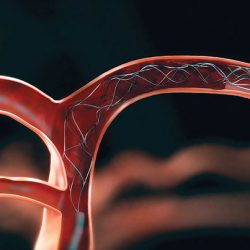In a study that included more than 20,000 adults in China with high blood pressure but without a history of stroke or heart attack, the combined use of the hypertension medication enalapril and folic acid, compared with enalapril alone, significantly reduced the risk of first stroke, according to a study appearing in JAMA. The study is being released to coincide with its … [Read more...]
Cardiovascular Health

Link between low blood sugar and cardiovascular problems: Temple University Study
Past studies have shown an association between strict control of blood sugar and increased mortality. These studies have also suggested that a consequence of this strict control is low blood sugar (called hypoglycemia), which may have adverse effects on the heart. In a new study, published by the journal Diabetes, researchers examined the effects of hypoglycemia on … [Read more...]
Vitamin D pill a day may improve exercise performance and lower risk of heart disease: Society for Endocrinology Study
Taking vitamin D supplements can improve exercise performance and lower the risk of heart disease, according to the findings of a preliminary study presented today at the Society for Endocrinology annual conference in Edinburgh. Vitamin D, which is both a vitamin and a hormone, helps control levels of calcium and phosphate in the blood and is essential for the formation of … [Read more...]
Vitamin C related to reduced risk of cardiovascular disease: A Danish Study
New research from the University of Copenhagen and Herlev and Gentofte Hospital shows that high vitamin C concentrations in the blood from the intake of fruit and vegetables are associated with a reduced risk of cardiovascular disease and early death. The study, which has just been published in the well known American Journal of Clinical Nutrition, is based on the Copenhagen … [Read more...]
‘Love hormone’ helps produce ‘bliss molecules’ to boost pleasure: University of California Study
The hormone oxytocin, which has been associated with interpersonal bonding, may enhance the pleasure of social interactions by stimulating production of marijuana-like neurotransmitters in the brain, according to a University of California, Irvine study. The research provides the first link between oxytocin -- dubbed the "love hormone" -- and anandamide, which has been … [Read more...]
Women under 55 less likely to be told they were at-risk of heart disease: American College of Cardiology Study
Even when young women had a similar or greater risk for heart disease than young men, they were 11 percent less likely to report that healthcare providers told them they were at-risk for heart disease prior to a heart attack, according to a new study published today in the Journal of the American College of Cardiology. "Young women who experience a heart attack are more … [Read more...]
Higher rates of in-hospital mortality in young women: American College of Cardiology Study
Young women with ST-elevation myocardial infarction were less likely to receive life-saving angioplasty and stenting to restore blood flow to blocked arteries than men and also had longer hospital stays and higher rates of in-hospital mortality, according to a study published today in the Journal of the American College of Cardiology. ST-elevation myocardial infarction, or … [Read more...]
Stroke in marijuana users more often caused by narrowing of arteries in skull: American College of Cardiology Study
A new study found strokes in young adults who use marijuana are more likely to be caused by stenosis, narrowing of the arteries, in the skull than strokes in non-users. Previous studies have found an association between marijuana use and stroke, but the new study published as a research letter in the Nov. 3 issue of the Journal of the American College of Cardiology is the … [Read more...]
Immune cells may heal an injured heart: A Washington University Study
The immune system plays an important role in the heart's response to injury. But until recently, confusing data made it difficult to distinguish the immune factors that encourage the heart to heal following a heart attack, for example, from those that lead to further damage. Now, researchers at Washington University School of Medicine in St. Louis have shown that two major … [Read more...]
MRI shows heart ages differently in women: A Study
The main pumping chamber of the heart ages differently in men and women, according to a new magnetic resonance imaging (MRI) study published online in the journal Radiology. Researchers said the findings may support different treatment approaches for men and women with heart disease. The mass of the left ventricle--the chamber of the heart that pumps blood throughout the … [Read more...]
Botox may prevent irregular heartbeat: American Heart Association Study
Botox -- known for reducing facial wrinkles -- may also prevent irregular heart rhythms when injected into fat surrounding the heart after bypass surgery, according to research in the American Heart Association journal Circulation: Arrhythmia and Electrophysiology. Botulinum toxin, commonly known as Botox, is produced by Clostridium botulinum bacteria. When a small amount of … [Read more...]
Sniffing and gasping can prevent fainting: European Society of Cardiology Study
Dr Bavolarova said: "Recurrent syncope (fainting) has serious effects on quality of life. Patients are often injured when they fall, which reduces their mobility and ability to look after themselves. Depression is common in these patients." The current study focused on the most common type of fainting, called vasovagal syncope, which can be caused by prolonged standing or … [Read more...]
Sex does not increase heart attack risk: American College of Cardiology Study
Sex is rarely the cause of a heart attack, and most heart disease patients are safe to resume sexual activity after a heart attack, according to a research letter published today in the Journal of the American College of Cardiology. Sexual activity can be a concern for many heart attack patients who worry about exertion triggering another heart event, but data on the harms … [Read more...]
Childhood infections and risk of early heart attack linked: European Society of Cardiology Study
"Cardiovascular disease (CVD) is the number one killer worldwide, including in Indonesia where it accounts for 31.9% of all deaths," said Dr Qanitha. "CVD risk factors are rising rapidly in South-East Asia, particularly in young people. Most Indonesian CVD patients are under 56 years old and still economically productive. This very young CVD onset raises the question of whether … [Read more...]
Low physical activity responsible for 17 percent of cardiovascular deaths in Argentina: European Society of Cardiology Study
"Argentina has high rates of physical inactivity," said Dr Roberto Peidro, a leading member of the Argentine Society of Cardiology and vice-president of the Argentine Foundation of Cardiology. "Lack of free time is the most important excuse given by sedentary people. On the other hand, doctors give insufficient advice about exercise." The current study investigated the … [Read more...]
Novel anti-clotting therapy in halted trial no better than existing agents: American College of Cardiology Study
A novel therapy that would allow doctors to turn the body's blood-clotting ability off and on in a more controlled way was about as effective as established anticoagulants in patients undergoing angioplasty but was associated with higher rates of moderate to severe bleeding, according to an analysis of data from a terminated Phase III trial presented at the American College of … [Read more...]
Restless legs syndrome linked to heart and kidney problems: A Study
Imagine trying to lie down and rest but feeling an uncontrollable urge to keep moving your legs. That, in a nutshell, is the ongoing ordeal facing people with restless legs syndrome. Considered a neurological, sleep, or movement disorder, RLS affects up to 1 in 10 people in the U.S. For those coping with a more severe form of RLS, countless sleepless nights--during which … [Read more...]
Flu shot reduces risk of stroke: University of Lincoln Study
The risk of suffering a stroke is significantly reduced for up to two months after receiving a flu vaccine, a major new study has shown. The research by the University of Lincoln, UK, funded by the National Institute of Health Research and published in the journal Vaccine, showed the chances of having a first stroke fell by around a fifth in the first 59 days after receiving … [Read more...]
New test predicts teens’ future risk of heart disease: University of Virginia Study
Risk for cardiovascular disease, currently running rampant in the United States, can now be predicted for adolescents thanks to a new diagnostic test developed by a University of Virginia Children's Hospital pediatrician and his collaborators. The test accounts for many risk factors for the deadly disease and has the potential to be adapted by physicians nationwide to assess … [Read more...]
Antihypertensive beta-blockers may increase cardiovascular risks: A Study
A two-drug antihypertensive treatment that included a beta-blocker was associated with increased risk for major adverse cardiovascular events (MACEs) and death in a study of Danish patients who underwent noncardiac surgery, according to an article published online by JAMA Internal Medicine. Use of ß-blockers during noncardiac surgery is being reevaluated … [Read more...]
Happy head, happy heart promote heart-healthy behaviors: A Study
People with heart disease may benefit from maintaining positive emotions, according to health researchers. Over the course of five years the researchers tracked more than 1,000 patients with coronary heart disease. Patients who reported higher positive psychological states were more likely to be physically active, sleep better and take their heart medications and … [Read more...]
To Statin or not to Statin?
Heart disease is the top killer of Americans and experts say there is no doubt that high cholesterol plays a big part. Cholesterol-lowering drugs or statins are “game-changers” for many patients, but for millions of Americans and their doctors it may be tough to decide whether to statin, or not. Erin O’Connell Peiffer walks a lot and watches her weight. … [Read more...]
Retrievable Stents for Strokes
When someone suffers a stroke, time is critical. For every few minutes that blood and oxygen are blocked, portions of the brain suffer irreversible damage. Now, a technique designed to remove clots from large vessels in the brain may be highly effective in reducing stroke’s life-altering side effects. Patrick Mitchell is an actor and director with a community theater in … [Read more...]
Colds and flu may increase stroke risk in kids: American Academy of Neurology Study
Stroke is very rare in children, but colds, flu and other minor infections may temporarily increase stroke risk in children, according to a study published in the September 30, 2015, online issue of Neurology®, the medical journal of the American Academy of Neurology. The study also found routine childhood vaccines may decrease the risk of stroke. "Parents should be … [Read more...]
Beet juice boosts muscle power in heart patients: Washington University Study
Scientists have evidence that Popeye was right: Spinach makes you stronger. But it's the high nitrate content in the leafy greens -- not the iron -- that creates the effect. Building on a growing body of work that suggests dietary nitrate improves muscle performance in many elite athletes, researchers at Washington University School of Medicine in St. Louis found that drinking … [Read more...]
Short and intense exercise bursts can reduce heart risk in teens: University of Exeter Study
Adolescents who perform just eight to ten minutes of high-intensity interval exercise three times a week could be significantly reducing their risk of developing heart conditions, new research has concluded. Even apparently healthy teenagers showed significant improvements in markers which are indicators of cardiovascular health, according to research by the University of … [Read more...]
Midday naps associated with reduced blood pressure and fewer medications: European Society of Cardiology Study
Midday naps are associated with reduced blood pressure levels and prescription of fewer antihypertensive medications, according to research presented at ESC Congress today by Dr Manolis Kallistratos, a cardiologist at Asklepieion Voula General Hospital in Athens, Greece. "Although William Blake affirms that it is better to think in the morning, act at noon, eat in the … [Read more...]
Women with moderate beer consumption lower risk of heart attack: University of Gothenburg Study
Women who drink beer at most once or twice per week run a 30 per cent lower risk of heart attack, compared with both heavy drinkers and women who never drink beer. These are the findings of a Swedish study which has followed 1,500 women over a period of almost 50 years. In the study, researchers at the Sahlgrenska Academy, University of Gothenburg, have followed a … [Read more...]
Long sleep and high blood copper levels are linked: University of Eastern Finland Study
People who sleep fewer than 6 hours or more than 10 hours per night suffer from low-grade inflammation more often than people who sleep 7-8 hours per night. This was observed in a University of Eastern Finland study focusing on the health and lifestyle habits among middle-aged men. "Earlier studies have found a relation between reduced sleep and low-grade inflammation," says … [Read more...]
Drugs increase risk of heart attacks and strokes: A Case Western Reserve University Study
New research shows that medications which have raised safety concerns over heart attack and stroke risks may not have gotten approval from the Food and Drug Administration (FDA) if the cardiovascular effects of fluid retention had been better understood. Fluid retention may explain the increased risk of heart attacks and strokes of medications such as Vioxx®, Bextra®, and … [Read more...]
- « Previous Page
- 1
- …
- 6
- 7
- 8
- 9
- 10
- …
- 35
- Next Page »

